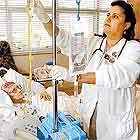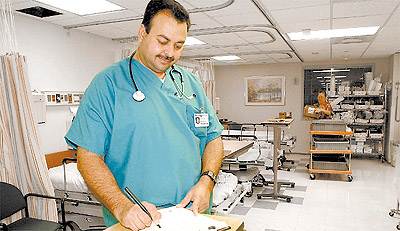|
 |
|
Esta página no está disponible en español. Cook County Plans For Nurse Drought: Puerto Rico Seen As Possible Savior…Exodus Of Nurses Alarms Island
Cook County Plans For Nurse Drought: Puerto Rico Seen As Possible Savior By James Janega, Tribune staff reporter. Feb. 2, 2003 Facing a shortage of registered nurses, Cook County commissioners are considering whether to recruit nurses from a university in Puerto Rico, one of the few places in the United States or its territories that enjoys a surplus of the medical professionals. "Recruiting nurses from Puerto Rico could really be a great benefit in addressing the 130 vacancies we have now in the John H. Stroger Hospital alone," said Commissioner Roberto Maldonado, chairman of the Cook County Board subcommittee that oversees Stroger and Cermak Hospitals. Maldonado said Illinois law allows nurses to be licensed here if they have been certified in other U.S. states or territories, including Puerto Rico. "They have the same curriculum to train nurses as institutions of higher education in the United States, and they take the same tests as in the United States," he said. Rendy Jones, director of communications for the Cook County Bureau of Health Services, said the idea is just one initiative under way to recruit nurses. The county also has recruited at local high schools, developed internship programs with nearby colleges, and set up booths at Cook County churches, health fairs and civic functions, she said. According to the U.S. Department of Health and Human Services, hospitals nationwide face a shortage of 110,000 registered nurses this year, and the U.S. Department of Labor warns that an additional 450,000 registered nurses will be needed by 2008. A Health Resources and Services Administration survey predicts a 4 percent shortage of nurses in Illinois by 2010 and a 20 percent shortage by 2020. "Illinois is not going to see a serious shortage for probably another five years," said Illinois Nurses Association spokeswoman Rebecca Knoepfle. "Currently, the numbers wouldn't show a shortage, but we're on the verge." Among those who testified at a Cook County subcommittee hearing Friday was the University of Puerto Rico's director of nursing, Mildred Flores-Rodriguez. Maldonado said the school's nurses could be ideal for Cook County, which places a premium on bilingual, Spanish-speaking nurses. An Illinois Department of Professional Regulation survey in 2000 found that 18 percent of the state's 140,000 registered nurses were not working in the nursing field, generally because of workplace dissatisfaction.
Exodus Of Nurses Alarms Puerto Rico Understaffed stateside hospitals are recruiting heavily in Puerto Rico, luring a record number of island nurses to better-paying mainland jobs. By Matthew Hay Brown | San Juan Bureau Feb. 23, 2003
In Orlando. ---------- SAN JUAN, Puerto Rico -- After 10 years as a pediatric nurse in one of Puerto Rico's largest children's hospitals, working in a closely knit team of seasoned professionals caring for young patients, Gloria Morales says she still loves her job. Just not enough to continue earning $14,000 a year in it. Morales, a licensed practical nurse at San Juan's Centro Medico, has seen enough of her colleagues move north to know she could triple her salary in a stateside hospital. She already has given her notice; come spring, she's moving to Tampa. "I need more money," says Morales, 50. "I have a lot of bills to pay. And I want to learn more nursing. I want to try another experience." She will be joining a record exodus of nurses from this U.S. commonwealth to the mainland. Lured by stateside hospitals offering higher pay and better working conditions, more than 1,100 departed last year. With states such as Florida now making it easier for nurses here to gain licenses there, the pace is expected to continue increasing. Health-care professionals on the island speak of an impending crisis. "The situation is very alarming," says Mildred Flores Rodríguez, president of the Puerto Rico College of Professional Nurses. "They're recruiting for nurses in the emergency room, in intensive care, in surgery. All the most critical areas are going to be affected." ---------- Better life. ---------- Professional and government officials are working to develop ways to attract and retain more nurses. But in a cash-strapped health-care system where full-time nurses may earn as little as $11,000 annually, they acknowledge the challenges they face. "Unfortunately, with our economic base we cannot compete in salaries," says island Health Secretary Johnny Rullán. "We can try to improve the quality of life on the job, to entice nurses to stay until changes can be made." With understaffed hospitals nationwide increasingly recruiting farther afield, the flow of nurses from island to mainland rose steadily from 209 in 1997 to 446 in 2001. Last year, the pace more than doubled. Through December, the most recent figures available, 1,103 nurses had left Puerto Rico for the United States. Many are settling in Florida, where regulations that took effect last May allow graduates of Puerto Rican nursing schools who have practiced for two years to gain a license in Florida without taking additional exams. Recruiters now visit the island regularly. Local newspapers advertise job fairs almost daily. At one such fair in San Juan last fall, Laura Lillie, a recruiter for a group of hospitals in North Florida, made contacts that have led to more than a dozen hires so far. "The hospitals were very happy with the results," she says. "They got good nurses with good experience and good English skills." Lillie says Puerto Rican nurses and Florida hospitals may make a particularly good match. The new hires earn more money living in a familiar climate where many already have relatives. The hospitals gain U.S. citizens trained to U.S. standards who are capable of communicating with an increasingly Spanish-speaking clientele. Couple's income doubles To seal the deal, recruiters typically offer signing bonuses and cover moving expenses. They may also help with transportation and housing costs on the mainland. "There is much temptation," says Magda Rivera, a pediatric oncology nurse at Centro Medico who says she has "three doors open" in Florida. Douglas and Marlynn Muñoz made the move last month. Both registered nurses, they say they were looking for more pay, better working conditions and a higher standard of living. "We are quiet people," Douglas says. "In Puerto Rico, there's too much traffic, a high incidence of crime. We were looking for a safe place and a quiet place that was more professional." With Douglas working in a private clinic and Marlynn at Centro Medico, the couple earned up to $40,000 annually in San Juan. In their new jobs at Florida Hospital East Orlando, they expect to double their income this year. Douglas says they are growing professionally, using unfamiliar technology and learning new procedures. "It's like starting again," he says. "I love it." Given the more than 32,000 registered or practical nurses licensed in Puerto Rico, the number that left last year represents less than 4 percent of the potential work force. But it's more than twice the number that graduated from island nursing schools. Officials worry about staffing in the future. "If nothing changes, we can have a problem," says Luz Delia Sánchez, the auxiliary secretary of health for nursing. The College of Professional Nurses has proposed a variety of measures to bolster the nursing ranks, ranging from promoting the field to high school students to establishing an annual base salary of $30,000 with bonuses for specialties. Funding is a problem Flores, president of the association, says Puerto Rico doesn't necessarily have to match the stateside offers, just come close enough to make staying on the island an option. "Many people want to stay close to family here," she says. "Not everyone has the traveler's spirit." Rullán says funding will remain a problem. The health-care system here is squeezed by its commitment to provide free prescription drugs to all Medicaid and Medicare patients, although Puerto Rico receives less reimbursement than the states. "The burden is tremendous," Rullán says. He has spoken of paying for continuing education courses and eliminating the fees nursing students now pay to practice at hospitals. He says changes in Medicaid and Medicare reimbursements and federal legislation to provide prescription drugs also would help. For now, his department is designing a survey to ask nurses what is attracting them to the mainland and what it would take to keep them in Puerto Rico. The private sector also is getting involved. The pharmaceuticals manufacturer Johnson & Johnson, a major island employer, has initiated a campaign that will include scholarships for nursing students and awards and training programs for professionals. Family ties bind Not all of Puerto Rico's nurses are leaving. After 20 years, nursing supervisor Nancy Pérez makes $26,000 at Centro Medico. A Chicago native who is fluent in English and Spanish, she thinks she could make $40,000 to $60,000 on the mainland. But she has decided to stay. "My family is here," says Pérez, 42. "The money sounds good, but life is more expensive there. Maybe I feel more tranquil here."
|

 ----------
----------